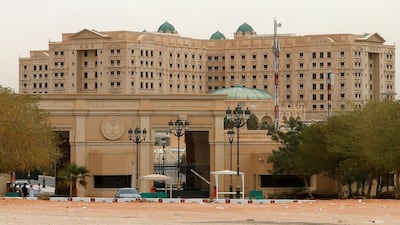Last week the Saudi government's anti-corruption investigation was concluded.
The public summoning of high- profile personalities has created a powerful incentive for ensuring anyone thinks twice before acting or risk being held accountable by authorities. However, is the proverbial stick the only way to tackle corruption?
Danila Serra, a professor at Southern Methodist University, has been studying corruption for several years, earning her the inaugural Vernon Smith ascending scholar prize from the International Foundation for Research in Experimental Economics. In the coming weeks, this column will examine what lessons Saudi policymakers can take from her award-winning research. The first is a recently published paper with Florida State University’s Dmitry Ryvkin, titled: “Corruption and competition among bureaucrats: an experimental study.”
The idea is simple and mirrors one of the most basic concepts in economics: competition helps to align individual incentives with those of society. This is the “invisible hand” mentioned by the father of modern economics, 18th-century Scottish philosopher Adam Smith.
By way of background, when I go to my local supermarket, the service is generally great. The staff are helpful, the prices are as low as I can find anywhere and there are many options. None of this occurs because the staff like me, or because the directors run the supermarket like a social enterprise. Instead, the driving force is competition for my business: there are several local supermarkets, and if one raises its prices or offers a lower-quality service, I will simply shop elsewhere. Moreover, if they try to collude to fix prices, they will fail, because there is enough geographic distance between the supermarkets that they cannot monitor each other easily, meaning that they cannot trust each other to raise prices in unison. Therefore, competition means that the supermarket’s best strategy for enriching itself is making customers happy.
Things look much worse in the absence of competition: as soon as there is an absence of choice, such as telecommunications markets in the Arabian Gulf pre-liberalisation, supermarkets are offered a way of enriching themselves by making customers unhappy (raising prices, lowering quality), rather than the reverse.
_______________
Read more:
Economics 101: Does Saudi Arabia’s anti-corruption drive scare foreign investors?
Economics 101: Contribution of Muslim economists needs greater acknowledgement
Economics 101: research studies are not easily swayed by conflict of interests
_______________
Notice that this quality assurance system largely works without the need for authorities to punish supermarkets that deliver poor quality or high prices.
Mr Ryvkin and Ms Serra argue that the same principle applies to petty corruption. Suppose you have to renew your driver’s licence, which requires visiting the relevant government office in person. Imagine that the renewal fee is $10. In principle, if monitoring is poor, the civil servant working at the counter could extort you, demanding an extra amount for himself under the table in exchange for executing the renewal.
In many countries, sadly, this kind of petty corruption is commonplace because a culture of corruption is prevalent and many higher officials are actually involved in the rackets, undermining the monitoring and complaints system.
The countermeasure Mr Ryvkin and Ms Serra propose is leveraging competition, which is a three-step process. First, there has to be choice: that means many different civil servants have to have the power to issue licence renewals, for instance.
Second, the choices have to be physically close enough to each other so that citizens can easily avoid a bad quality civil servant and find an alternative. If I have to go to another city, then that’s an ineffective introduction of choice as I will rarely take the time.
Third, it has to be difficult for those civil servants to collude, which means putting them in different branches that are far apart enough that they cannot monitor each other.
Just as with the supermarkets, competition helps to align the incentives of civil servants with those of the citizenry. Officials who charge under the table, especially at an egregious level, will quickly find themselves losing “customers”, which may lead to more problems for them as the suspicion of senior officials is aroused. Mr Ryvkin and Ms Serra explain that the effectiveness of this mechanism is amplified for high-frequency transactions, such as paying to go through a toll on your daily commute to work, rather than low frequency ones, such as getting a marriage licence, as higher frequency means a larger role for competition in holding miscreants accountable.
The effectiveness of competition, both in the marketplace and in government transactions, as a way of ensuring high quality should not be confused with its being perfect. After all, certain services, such as health care and education require more than just competition, especially because they involve large upfront expenditures for a service that cannot be returned, and whose quality is hard to assess up front. That is why in those cases, and others, some combination of oversight and competition can deliver superior outcomes.
In the case of Saudi Arabia, one hopes that such petty corruption is not a major issue. However, the same principle may apply to tenders: to avoid corrupt allocations of tenders, the government might consider having multiple units in charge of tenders so that bidders can gravitate to the tender board that delivers the best service.
Next week, we will continue to examine how Serra’s research can assist Saudi Arabia in tackling corruption.
Omar Al-Ubaydli (@omareconomics) is a researcher at Derasat, Bahrain.


